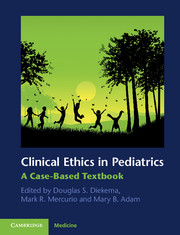Book contents
- Frontmatter
- Contents
- Contributors
- Preface
- Section 1 Core issues in clinical pediatric ethics
- Section 2 Ethical issues at the beginning of life: perinatology and neonatology
- Section 3 When a child dies: ethical issues at the end of life
- Section 4 Ethical issues posed by advances in medical technology and science
- Section 5 Children, public health, and justice
- 34 Resource allocation and triage in disasters and pandemics
- 35 Parental refusals of vaccination and school vaccine mandates: balancing parental freedom, child welfare, and public health
- 36 When institutional, professional, and public health obligations conflict: the controversial case of youth boxing
- Section 6 Special topics in pediatric ethics
- Index
- References
34 - Resource allocation and triage in disasters and pandemics
from Section 5 - Children, public health, and justice
Published online by Cambridge University Press: 07 October 2011
- Frontmatter
- Contents
- Contributors
- Preface
- Section 1 Core issues in clinical pediatric ethics
- Section 2 Ethical issues at the beginning of life: perinatology and neonatology
- Section 3 When a child dies: ethical issues at the end of life
- Section 4 Ethical issues posed by advances in medical technology and science
- Section 5 Children, public health, and justice
- 34 Resource allocation and triage in disasters and pandemics
- 35 Parental refusals of vaccination and school vaccine mandates: balancing parental freedom, child welfare, and public health
- 36 When institutional, professional, and public health obligations conflict: the controversial case of youth boxing
- Section 6 Special topics in pediatric ethics
- Index
- References
Summary
Case narrative
A children’s hospital has formed a disaster planning committee to develop and implement a formal disaster policy. The committee’s work proceeds uneventfully until deliberations begin on a framework for triage. The committee struggles to reach consensus on a framework for determining who should receive limited resources and how those resources should be allocated following a mass casualty incident. Should those with the highest risk of mortality receive intervention? How should their prognosis be determined? Who should make the allocation decisions; should it be someone other than the actual caregivers? Under what conditions will caregivers who participate in reallocation of resources face civil and criminal penalties? In particular, the committee becomes highly polarized when it begins discussions around the following hypothetical scenario.A pandemic from influenza has caused severe shortages of mechanical ventilators and other life-sustaining treatments across the country. All of the intensive care unit (ICU) beds in the hospital are occupied by infants and children requiring mechanical ventilation, many of whom are critically ill from influenza. All non-emergency surgical cases have been canceled, and all step-down units and post-anesthesia recovery areas are being utilized. In addition, all of the hospitals in the region are experiencing the same shortages and therefore cannot provide any assistance. All but one of the hospital’s ventilators are being used by patients who would die without them. Given these circumstances, which of the following three patients in the hospital’s emergency department should be prioritized to receive the one available ventilator?
A 5-year-old girl, previously healthy, with severe pneumonia.
An 18-year-old boy with Duchenne muscular dystrophy, dependent on tracheostomy and mechanical ventilation for neuromuscular respiratory failure, wheelchair bound, and now with severe acute respiratory distress syndrome.
A 5-month-old infant with Down syndrome (trisomy 21), now with sepsis and multi-organ failure.
- Type
- Chapter
- Information
- Clinical Ethics in PediatricsA Case-Based Textbook, pp. 199 - 204Publisher: Cambridge University PressPrint publication year: 2011
References
- 3
- Cited by



